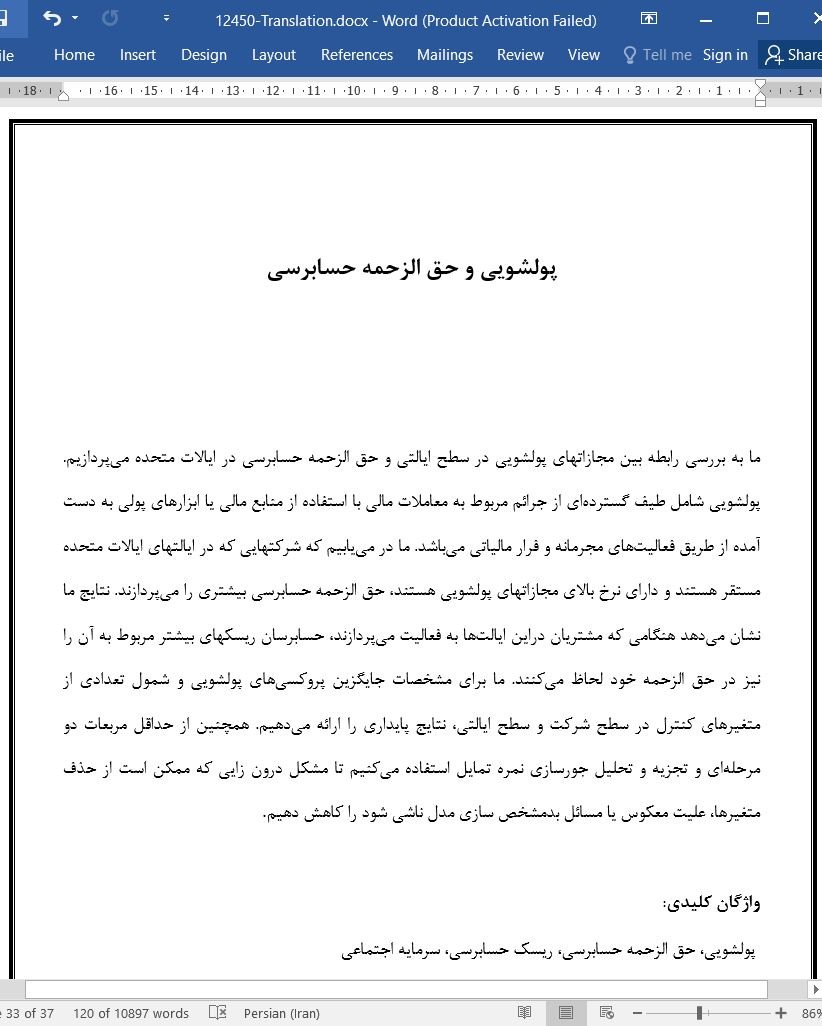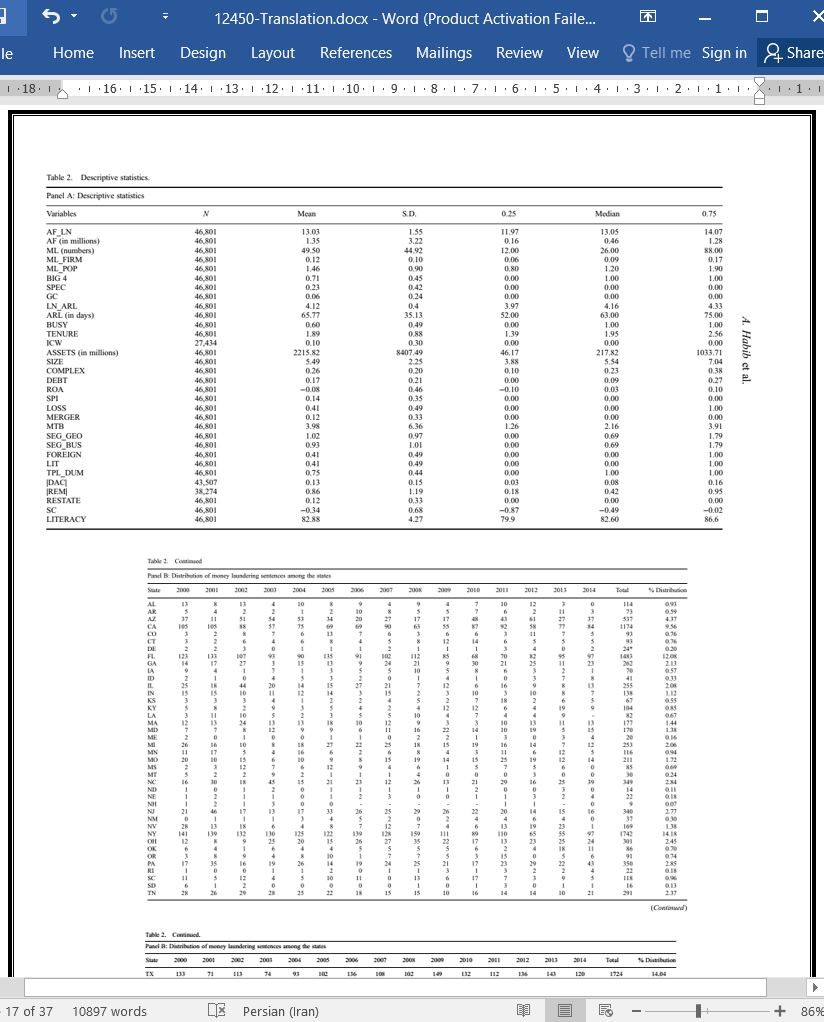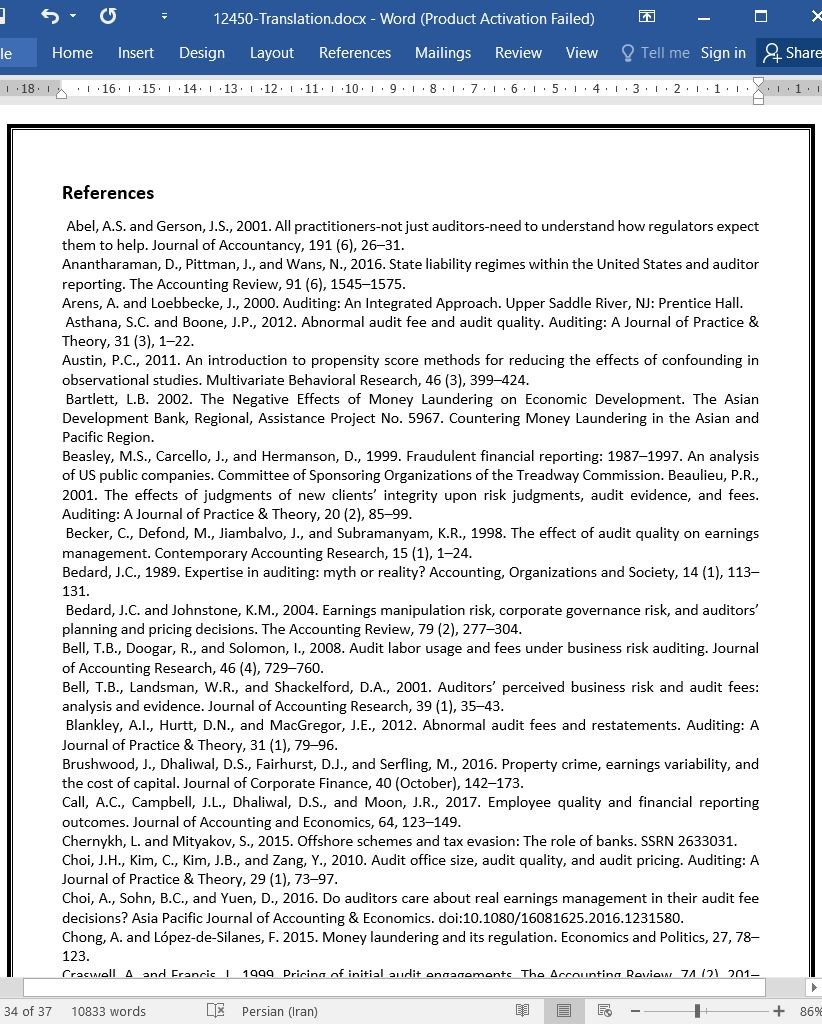
دانلود مقاله پولشویی و حق الزحمه حسابرسی
ما به بررسی رابطه بین مجازاتهای پولشویی در سطح ایالتی و حق الزحمه حسابرسی در ایالات متحده میپردازیم. پولشویی شامل طیف گستردهای از جرائم مربوط به معاملات مالی با استفاده از منابع مالی یا ابزارهای پولی به دست آمده از طریق فعالیتهای مجرمانه و فرار مالیاتی میباشد. ما در مییابیم که شرکتهایی که در ایالتهای ایالات متحده مستقر هستند و دارای نرخ بالای مجازاتهای پولشویی هستند، حق الزحمه حسابرسی بیشتری را میپردازند. نتایج ما نشان میدهد هنگامی که مشتریان دراین ایالتها به فعالیت میپردازند، حسابرسان ریسکهای بیشتر مربوط به آن را نیز در حق الزحمه خود لحاظ میکنند. ما برای مشخصات جایگزین پروکسیهای پولشویی و شمول تعدادی از متغیرهای کنترل در سطح شرکت و سطح ایالتی، نتایج پایداری را ارائه میدهیم. همچنین از حداقل مربعات دو مرحلهای و تجزیه و تحلیل جورسازی نمره تمایل استفاده میکنیم تا مشکل درون زایی که ممکن است از حذف متغیرها، علیت معکوس یا مسائل بدمشخص سازی مدل ناشی شود را کاهش دهیم.
1. مقدمه
این مقاله، رابطه بین مجازاتهای پولشویی در سطح ایالتی، یک منبع مهم و کاوش نشده از ریسک تجاری مشتریان و حق الزحمه های حسابرسی در ایالات متحده را مورد بررسی قرار میدهد. هدف پولشویی به عنوان یک عمل مجرمانه که پنهان کردن یا مبهم سازی ماهیت، منبع، محل یا گردش پول به دست آمده از فعالیتهای غیرقانونی است، هدف گستردهای است و بصورت 2-5درصد از تولید ناخالص داخلی جهانی (GDP) یا 800 میلیارد دلار تا 2 تریلیون دلار کنونی آمریکا برآورد میشود (دفتر مقابله با مواد مخدر و جرم سازمان ملل متحد (UNODC) 2016). پولشویی به دلایل مختلفی از جمله تحریفات اقتصادی، بی ثباتی پولی، آسیب پذیری نظام مالی، افزایش فساد و بی ثباتی اقتصادی - اجتماعی، اثرات مخربی بر اقتصاد دارد (Drayton، 2002؛ Dowers و Palmreuther، 2003). پولشویی یک مسئله جهانی است که در ایالات متحده نیز وجود دارد، هرچند که تغییراتی در مجازاتهای پولشویی در سراسر ایالات متحده وجود دارد. 1 ما واکنش حسابرسان نسبت به این تغییرات در مجازاتهای پولشویی را از منظر قیمتگذاری حسابرسی بررسی میکنیم.
5 نتیجه گیری
در این مقاله، ما اثرات پولشویی را به عنوان یک عمل مجرمانه که هدف آن پنهان کردن یا مبهم سازی ماهیت، منبع، محل یا گردش پول به دست آمده از فعالیتهای غیرقانونی است و همچنین تصمیم حسابرسان برای مطالبه حق الزحمه حسابرسی بیشتر، بررسی کردهایم. انگیزه انجام این مطالعه، کمبود تحقیقات در مورد ریسکهای ناشی از فعالیتهای گستردهتر در سطح اقتصاد است: ریسک ناشی از فعالیت در ایالات دارای مجازات بالای پولشویی، در ایالات متحده ارزیابی شده است. مطالعه ما، افزایش در حق الزحمه حسابرسی را برای مشتریانی که دفتر مرکزی آنها در در ایالات دارای مجازات بالای پولشویی قرار دارد نشان میدهد.نتایج ما بسیار مهم و غیربدیهی است. ما افزایش 2.2 درصدی را در حق الزحمه حسابرسی برای یک افزایش در انحراف معیار نرخ مجازات پولشویی نشان میدهیم. نتایج ما به دلیل استفاده از تعدادی از متغیرهای کنترل در سطح ایالتی، مانند سرمایه اجتماعی، نتایج پایداری است (Jha و Chen، 2015).
ما پیش از این با بررسی عامل تعیین کننده حق الزحمه حسابرسی به مقالات مربوط به حق الزحمه حسابرسی کمک کردهایم. شواهد پیشین ارائه شده توسط Lyon و Maher (2005) نشان دادهاند که حق الزحمه حسابرسی برای مشتریانی که در کشورهایی فعالیت دارند که رشوه دادن به مسئولان پذیرفته شده است، بیشتر است. ما یک شکل غیرقانونیتر از عمل مجرمانه یعنی پولشویی را در نظر میگیریم. همچنین به درک پیامدهای اقتصادی فعالیتهای پولشویی کمک میکنیم. اگرچه، تا جاییکه می دانیم مقالات حرفهای در مورد پولشویی به تعدادی از اثرات منفی اقتصادی آن اشاره کردهاند، اما ما اولین کسی هستیم که پولشویی را با پاسخ حسابرسان به ریسک کسب و کار مشتریان و در نتیجه حق الزحمه حسابرسی مرتبط کرده است.
We investigate the association between state-level money laundering sentences and audit fees in the US. Money laundering measures a broad category of offenses involving financial transactions using funds or monetary instruments gained through criminal activities and tax evasion. We find that firms headquartered in US states with high rates of money laundering sentences pay more audit fees. Our results suggest that auditors incorporate, as a fee premium, the higher risks involved when clients operate in those states. Our result remains robust to alternative specifications of money laundering proxies, and to the inclusion of a number of firm-level and state-level control variables. We also conduct two-stage least squares and propensity score matching analysis to mitigate the endogeneity problem that might arise from omitted variables, reverse causality, or model misspecification problems.
1. Introduction
This paper investigates the association between state-level money laundering sentences, an important and unexplored source of clients’ business risk, and audit fees in the US. Money laundering, a criminal act aimed at concealing or obfuscating the nature, source, location, or movement of money derived from unlawful activities, is pervasive and estimated to be 2–5% of global gross domestic product (GDP), or $800 billion to $2 trillion in current US dollars (The United Nations Office on Drugs and Crime [UNODC] 2016). Money laundering has damaging effects on the economy for a number of reasons, including economic distortions, monetary instability, vulnerability of the financial system, increased corruption, and socioeconomic instability (Drayton 2002, Dowers and Palmreuther 2003). Money laundering is a global problem, including in the US, although there are variations in money laundering sentences across US states.1 We examine the response of auditors to such variations in money laundering sentences, from the perspective of audit pricing.
5. Conclusions
In this paper, we examine the effects of money laundering: a criminal act aimed at concealing the nature, source, location, or movement of money derived from unlawful activities; on auditors’ decision to charge higher audit fees. Our study is motivated by a lack of research on risks emanating from broader economy-level operations: the risks of operating in states with high money laundering sentencing rates in the US. Our study documents an increase in audit fees for clients headquartered in high money laundering risk states. Our results are nontrivial as well. We document a 2.2% increase in audit fees for a one standard deviation increase in the money laundering sentencing rate. Our results are robust to the inclusion of a number of state-level controls, including social capital (Jha and Chen 2015).
We contribute to the audit-fee literature by investigating a hitherto unexplored audit fees determinant. Prior evidence by Lyon and Maher (2005) finds that audit fees are higher for clients operating in countries where the bribing of officials is an accepted norm. We consider a more egregious form of criminal act: money laundering. We also contribute to understanding the economic consequences of money laundering activities. Although the professional literature on money laundering has alluded to a number of its adverse economic effects, to the best of our knowledge, we are the first to relate money laundering with auditors’ response to clients’ business risk and, hence, to audit fees.
H1: Ceteris paribus, audit fees will be higher for firms headquartered in states with high rates of money laundering sentences.
H1: اگر اوضاع بر همین روال بماند، حق الزحمه حسابرسی برای شرکتهای مستقر در ایالتهای که دارای نرخ بالای مجازاتهای پولشویی هستند، بیشتر خواهد بود.
1. مقدمه
2. مقالات پیشین و تدوین فرضیه
3. طرح تحقیق
3.1. انتخاب نمونه و منبع دادهها
3.2. متغیر مستقل: پولشویی
3.3. مدل رگرسیون
4. نتایج تجربی
4.1. آمار توصیفی
4.2 نتایج همبستگی
4.3 نتایج رگرسیون
4.4 کانالی که از طریق آن پولشویی بر حق الزحمه حسابرسی تأثیر میگذارد
4.5 آزمونهای درون زایی
4.6 جورسازی نمره تمایل
4.7 تحلیلهای بیشتر
5 نتیجه گیری
منابع
1. Introduction
2. Prior literature and hypothesis development
3. Research design
3.1 Sample selection and data source
3.2. Independent variable: money laundering
3.3 Regression model
4. Empirical results
4.1. Descriptive statistics
4.2. Correlation results
4.3. Regression results
4.4. The channel through which money laundering affects audit fees
4.5. Endogeneity tests
4.6. Propensity score matching
4.7. Additional analyses
5. Conclusions
References
- اصل مقاله انگلیسی با فرمت ورد (word) با قابلیت ویرایش
- ترجمه فارسی مقاله با فرمت ورد (word) با قابلیت ویرایش، بدون آرم سایت ای ترجمه
- ترجمه فارسی مقاله با فرمت pdf، بدون آرم سایت ای ترجمه



